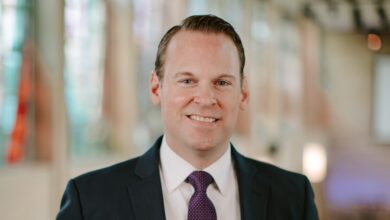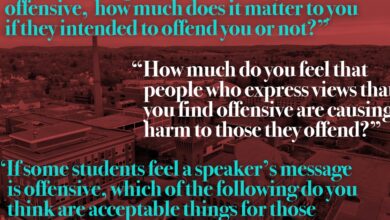A Controversial Blog at U. of Iowa Shuts Down. Are Lawmakers to Blame?

[ad_1]
He did so through a blog, published on the university’s uiowa.edu domain. Jones manages the university’s network of sensors on rivers and streams that track water-quality data in real time. His writing drew on that and other data sources. But his posts were not dispassionate dispatches of facts and figures. They were infused with Jones’s voice — funny, as well as reproving and provocative. Fear of corn ethanol’s downfall, he wrote in February 2022, is causing Iowa politicians “to soil not just our rivers but also their drawers, and start suggesting really, really stupid stuff.”
Jones’s core argument has long been that Iowa’s water-pollution problems are solvable, but that the state’s powerful agriculture lobby and the policymakers who court its approval resist meaningful solutions at most every turn. “It’s not uncommon to hear some variation of ‘We’re a farm state, get used to it,’” Jones wrote last month. “I reject that. And I think if the state is to have a prosperous future, it needs to be rejected by the masses.”
That post, with the headline “No Man’s Land,” was Jones’s last on his blog hosted by the university. The day it went live, Jones submitted his notice that he was retiring. His last day is May 16.
What happened? It appears that two Republican state senators approached a university-affiliated lobbyist about Jones’s blog. They were not pleased. The lobbyist passed that message to Jones’s supervisor, who discussed it with Jones.
Jones told The Chronicle he feared that if nothing were done, lawmakers would cut state funding for a program of the university laboratory where he works. Jones’s supervisor, Larry J. Weber, told The Chronicle that while the decision to shutter the blog was, from his perspective, “multifaceted,” he, too, was concerned that state funding was in jeopardy.
The circumstances leading to the blog’s last post and what happened next illustrate how tough the climate for environmental researchers can be in a state dominated by the agriculture industry. It also shows that pressure on academics does not require direct threats or coercion, but is sometimes created by an accumulation of history, circumstances, and incomplete communication.
Jones’s job, in part, was to oversee a network of water sensors across the state that generate a huge amount of data for scientists, at the university and elsewhere. They help observers track Iowa’s progress, or lack thereof, on its goal of significantly decreasing the amounts of nitrogen and phosphorus in its water, elements that are commonly found in waste running off farmland..
Jones started to publish “little essays” on water-quality issues, though for a while “nobody really read them,” he said. Once he started injecting more of his own perspective, he gained an audience. Many people read a 2019 post in which Jones calculated, roughly, how much waste Iowa’s livestock excreted, and concluded it was equivalent to that of 134 million human beings. “The sheer amount, and the logistical complications of hauling and handling it, have consequences for water quality,” he wrote.
Fans of Jones praised his engaging prose, his ability to synthesize complex issues, and his drawing attention to problems few people knew about. He became an outspoken voice in the state on water-quality issues, such as Iowa water’s significant contribution to a massive “dead zone” in the Gulf of Mexico.
But his writing also attracted critics. After Jones wrote another post about animal waste, with the headline “Fifty Shades of Brown,” the Iowa Farm Bureau Federation’s public-relations manager faulted what she called Jones’s “poop blog.” “Comparing hog manure to human waste stinks,” she wrote in an opinion column. “That’s because one has value and the other doesn’t.” (Jones responded, naturally, on his blog.)
It’s not uncommon to hear some variation of ‘We’re a farm state, get used to it.’
Pointing out the agricultural pollution of Iowa’s water has long been controversial. Not only did some of Jones’s posts “touch a nerve” with those involved in industrial agriculture, said Weber, who directs IIHR and hired Jones. Jones’s posts also occasionally rankled environmental groups — he was less willing than they were to see the industry as part of the solution, Weber said.
One frustrated reader was Chad Ingels, a Republican state representative who is a farmer and founder of ClearWater Ag Strategies, LLC. In an op-ed Jones published in 2021, adapted from a blog post, he argued that Iowa’s “landed gentry — the mainly white, many wealthy, some especially wealthy farmers … are polluting the water in a community where many poor people and people of color live.”
Jones concluded: “The corn, soy, and hog industries rationalize this injustice by telling us that we should turn a blind eye to the pollution that their practitioners, all (white) paragons of virtue of course, need to generate because they are feeding the world.”
Ingels was not impressed. In an email to a couple of faculty members, including IIHR’s director at the time, he criticized Jones as “race-baiting,” saying it could make lawmakers less likely to support water-quality efforts, The Gazette reported. “I have been supportive of academic freedom on campus, and even voted against eliminating tenure on college campuses,” Ingels wrote. “However, public comments like these make me reconsider my position.”
When criticism of the blog arose, Jones and Weber would weather it together. The two men are close friends. They’d sometimes discuss if the blog still had value, Weber said. “For all those years, I said, ‘Keep going, soldier.’”
Later that day, Weber got a phone call from Keith Saunders, chief government-relations officer for the Board of Regents, which oversees the state’s three public universities. Saunders told Weber that Dan Zumbach and Tom Shipley, two Republican state senators, had complained to him about Jones’s blog. They had printed out at least two of Jones’ posts — “God Made Me Do It” and “Mamas, Don’t Let Your Babies Grow Up to Be Farmers,” according to Weber.
The senators “basically came forward and said, ‘Here we are once again with the Iowa Flood Center over at the Capitol asking for money. And at the same time, you have this, you know, this blog. You allow this to go on,’” Weber said, summarizing what he said Saunders had told him. (Saunders did not respond to requests for comment.)
Weber said Saunders had simply shared the information, without any directive on what to do. The next day, he and Jones met to discuss the blog’s future. The flood center receives money, typically over $1 million, from the state. That reality was on both of their minds.
The message from the senators was essentially, “‘You guys can’t be over here asking for money for these various programs and at the same time allow this blog to continue,’” Jones told The Chronicle, summarizing what he remembers Weber telling him. “Now, is that a threat? Is that a threat to defund something? I think it’s definitely something you better take seriously.”
‘You guys can’t be over here asking for money for these various programs and at the same time allow this blog to continue.’
Weber told The Chronicle he was concerned that state funding was at risk not only for the flood center but also for the sensor network, should the blog continue. Funding is always a concern because it “means positions, mostly,” he said. “These are real people. Real people with spouses and houses and kids and commitments.” Money for the flood center had been on the chopping block in 2017, before lawmakers agreed to restore most of it, according to The Gazette. Now Weber thought closing the blog would put it and the sensor network in less peril.
But from Weber’s perspective, though the state legislators’ frustration with the blog had spurred his conversation with Jones, it was not the only reason to end publication. He said he and Jones had talked yet again about whether the blog was having the impact that Jones desired. Some people had grown tired of Jones’s communication style. In their meeting, Jones listed people who “didn’t want to talk to him or engage with him anymore,” Weber said. “That, too, was part of the conversation that we had.”
Jones remembered their conversation similarly. But at the forefront of his mind was the possible loss of state funding. With the clear impression that his blog was putting that money at risk, he thought about the sacrifice. “I’m one guy,” he reasoned. “I am not worth an entire program.”
Zumbach, who is also a farmer from eastern Iowa, told The Chronicle in an email that “no threat to funding was ever made because of the content of a blog.” Any assertion to the contrary is “reckless and potentially defamatory.” He did not respond to follow-up emails.
These guys at the legislature, I mean, they’re punching down a long, long ways.
Shipley, who has worked as a legislative liaison for the Iowa Cattlemen’s Association, confirmed to The Chronicle during a brief phone call that he had met with Saunders about Jones’s blog but did not elaborate on what they discussed. He then hung up. He did not respond to follow-up phone calls or an emailed interview request.
Ultimately, Jones and Weber agreed Jones would stop publishing the blog, at least on the university’s domain.
Jones messaged a colleague after the meeting to say that “it’s curtains” for the blog. Weber “didn’t ‘officially’ order me to stop writing, but you know how these things work.” Still, “I wasn’t angry or bitter about it,” Jones told The Chronicle. “I anticipated this possibility for a long time.” (The Substack newsletter Deep Midwest: Politics and Culture first published an interview with Jones about what had happened.)
Jones drafted a farewell post. It included two sentences that hinted at the blog’s fate: “I’ve written these essays, especially over the last two years, knowing that I was basically a dog chasing cars. Once in a while, even a three-legged dog like me can get too close to the rear wheels, and well, that happened.”
He sent the draft to Weber, who did not like those sentences. The director told The Chronicle that they “felt to me like, OK, now you’re really just begging for someone to say, ‘What happened?’” Weber said he had shared the draft with Saunders, and the lobbyist had taken issue with the same sentences. Asked why he had sent the draft to Saunders, Weber said he’d wanted a second opinion and validation that he “wasn’t being too sensitive.”
Weber and Jones had a series of conversations about the post over several days. Weber told Jones the sentences needed to come out. On principle, Jones disagreed. “Being told that I couldn’t mention or even imply something that objectively happened was a problem for me,” he told The Chronicle. “… How can scholars do their work when they can’t even mention what the truth is?”
He ultimately acceded to Weber’s wishes. Jones also asked the director if that call had come from Weber or from “above” him, meaning from someone higher up at the university. Weber told Jones it had come from above.
He told The Chronicle that his assertion to Jones had not been true. “I regret saying that to him. It came from me. I own it,” Weber said, adding that he’d later apologized to Jones.
Why would our laws and our government and one of our industries even consider something this atrocious?
The post, dated April 2, went live on April 6. Jones let readers know he was considering continuing the blog on another website — which Weber had encouraged him to do — but he had not made up his mind.
He thanked people for reading: “I hope I helped you learn something.”
By then, Jones, who is 62 and had planned to work for at least another year, had decided he’d had enough. He just “didn’t want to deal with this controversy anymore.”
Later that morning, he told Weber he was retiring. He hoped lawmakers would leave funding for the flood center untouched.
The measure, which has passed both chambers, shifts $500,000 from what’s called the Iowa Nutrient Research Center, housed at Iowa State University, to a water-quality program in the state’s department of agriculture and land stewardship.
The Nutrient Research Center financially supports the sensor network. It sends money to IIHR for the network’s operation and maintenance. Weber said he’d spoken with Matthew Helmers, the Nutrient Research Center’s director, about receiving that amount — $500,000 — this year to keep the network running and to support related scientific research and other work.
What’ll happen next is not clear. Weber said he could not speak for Helmers but noted that Helmers recognizes the network’s importance. However, if the Nutrient Research Center decides to continue funding the network, Weber said, “then obviously that comes at the cost of something else.” (Helmers did not respond to The Chronicle’s interview request.)
Zumbach, one of the senators who purportedly took issue with Jones’s blog, sponsored the budget measure in the Senate. He did not mention the sensor network when discussing the measure. “What we do know is practices on the land and in our towns is what makes cleaner water,” he told his fellow senators.
To Sarah Trone Garriott, a Democratic state senator, “that’s robbing Peter to pay Paul,” she told The Chronicle. “We can easily fund that without cutting the other,” she said, referring to the agriculture-department program and the water-sensor network. Eliminating the network means “we won’t have a clear picture of what’s going on in our state.”
To Jones, “this all looks sort of retaliatory.” He’s written critically about Zumbach — remember the Iowa politicians who were soiling not just the state’s rivers “but also their drawers”? He’s also written and given interviews about a saga that involves Zumbach’s son-in-law, who, according to The Gazette, co-owns a cattle feedlot near Bloody Run Creek, a trout stream.

David Thorenson
Bloody Run is one of only a few water bodies in Iowa designated as “outstanding,” Jones wrote in 2020. As cattle produce a tremendous amount of waste, “even under the most ideal circumstances and weather conditions, it would be a colossal challenge to reconcile this operation with maintaining Bloody Run in its present condition.”
The feedlot’s proposed plan for managing waste, in Jones’s estimation, was far from ideal. After sharing more facts and figures, Jones continued: “Why would our laws and our government and one of our industries even consider something this atrocious? The truth is, what I just described repeats itself month after month, year after year, legally, all over Iowa, because of the way our laws governing livestock production are structured. This is one reason why our water, yours and mine, is polluted.”
Two water-quality sensors are located on Bloody Run, including one that’s within sight of the cattle operation, Jones said. Perhaps the sensor network, he said, “is being killed so the sensors up there could not reveal any pollution that’s resulting from this cattle feedlot.”
(Zumbach was accused of using his influence to gain environmental approval for the project, but an Iowa Senate committee dismissed the complaint, The Gazette reported. A county judge recently reversed a state department’s decision to allow the feedlot, ruling that the agency had used “illogical interpretations and applications.”)
Zumbach did not respond to a request for comment about the budget measure or the feedlot.
Jones is now days from retiring. He’s started writing on Substack and has a book coming out — The Swine Republic: Struggles With the Truth About Agriculture and Water Quality — that includes many of his blog posts, which are still available on his university page.
Meanwhile, when asked about campus researchers’ ability to share their work freely, the university responded with a short emailed statement. “Our faculty and staff must have the ability to teach and conduct research without fear of suppression,” it says. “The president and provost have been very consistent in their support of academic freedom.”
In his conversations with The Chronicle, Jones said he was sad that his writing — though it had changed the tenor of the conversation and created more awareness of water-quality issues in the state — hadn’t improved water quality itself. He emphasized how low he ranks in the academic hierarchy. “These guys at the legislature, I mean, they’re punching down a long, long ways,” he said. He showed letters he’d received from University of Iowa presidents thanking him for sharing his expertise with the media. Those feel a bit ironic now.
Though he cracked jokes, Jones sounded tired. At one point, he spoke of how difficult it can be to work in an environment in which so much relies on the whims of state lawmakers. “You just don’t know what these guys in the legislature are going to do,” he said.
Confronting moral questions while doing your job is “exhausting,” Jones said. “You want to make the right decision,” he said, “but you don’t know what it is.”
[ad_2]
Source link






